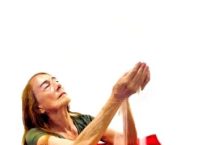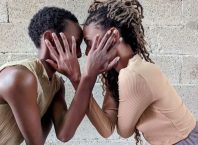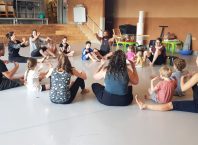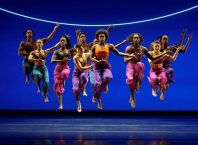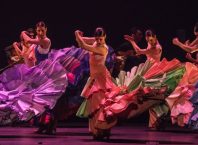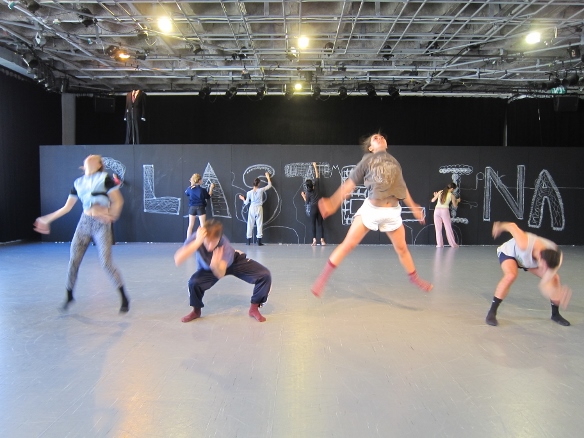
“I’m the luckiest bastard,” Ohad Naharin said, in an open rehearsal of Naharin’s Virus performed by the Batsheva Young Ensemble. Watching the expressive, remarkably skillful, and energetic dancers, one cannot deny the force of his words. They are an amazing ensemble! Naharin’s Virus, which premiered in 2001, is in advanced stages of rehearsal now and will premiere in January 2017.
Naharin’s Virus is an adaptation of Peter Handke’s play Offending the Audience, and includes approximately 30% of the text, translated into Hebrew. Yet it is not a theatrical work, it is very emphatically dance. The dancers performed a selection from the work in an open rehearsal that took place yesterday at the Batsheva studio.
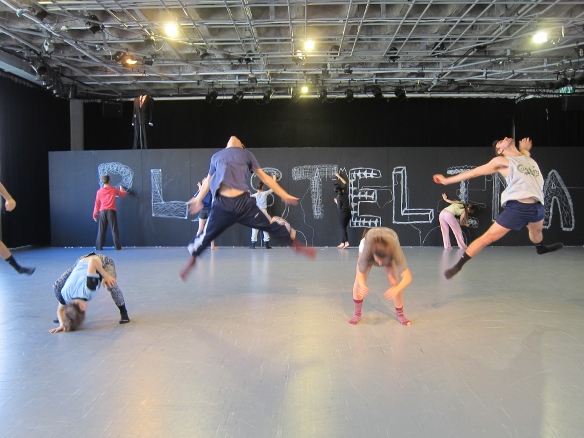
Naharin commented on the play, which was written in the 1960s: “It’s negating everything that is conventional in theatre, it’s a lot about what you are not going to see. It’s a lot about emptying our brain from expectations. This act creates actually some kind of a void and it’s a nice place to dance, this void. It’s like creating a space for us to put our dance in – and that’s what I do with Virus… I use this negating and void to put the work into it…I use a big chunk at the end. In the last 7 minutes the speaker basically curses and offends … offends everybody. It’s not particular, it’s really everybody, and if you realize that it’s everybody you can start seeing also the humor – that actually he’s laughing at himself, he’s cursing himself, because he’s cursing everybody, he’s included. So you don’t feel that it’s racist or prejudice, you just feel connected to some kind of reality that comes out of it.”
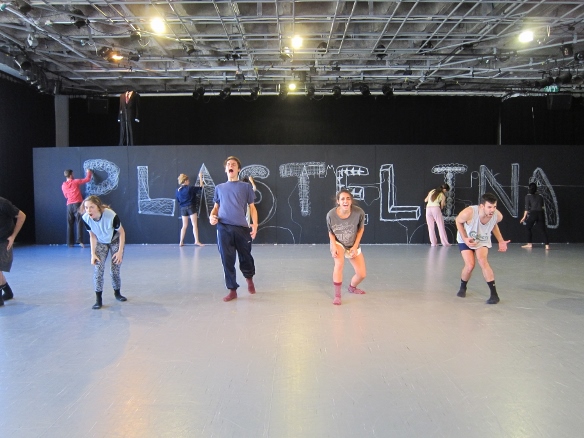
The soundtrack for Naharin’s Virus includes Arabic folk music arranged and performed by Habib Alla Jamal and Khader Shama. When asked how he felt about the issue of cultural appropriation in relation to his use of this music, Naharin replied, “This music is from this land. This is more Israeli music than any other music, this is not just Arabic music it is Irsaeli music. It was written, composed, and performed in this land for many hundreds of years, so it depends on what kind of point of reference you allow yourself to use when you hear this music… this is beautiful music, it’s really beautiful music, it has skill, passion, imagination, humor… I love it. There is a by-product which has to do with the point of reference that each of us can use when we hear this music – and you’re welcome to use it, but you cannot use the point of reference as what manages your experience and prevents you from having a real fresh moment here when you see it. Don’t forget what you know about Palestine, Israel, Arabs. Don’t forget it, but do not let it manage your experience. We offer you a lot of other stuff too… My political opinions are known. I don’t care to convey them through my work. Through my work, I convey other things, but if I did an interview and you asked me about the occupation I would be very clear.”
Naharin, praising his dancers, said, “I have had the privilege of working with many truly wonderful people for many years, but this year especially, everywhere I look I see something fascinating…there is something about this group that is very rare.”
Naharin’s Virus will premiere on January 11, 2017. Performance times and additional information is available in English on the Batsheva Dance Company website.

Naharin’s Virus
By Ohad Naharin
Performed by 16 Batsheva – the Young Ensemble dancers
60 minutes, without intermission
*The show includes some Hebrew text
An adaptation of Peter Handke’s play “Offending the Audience”.
Text: Peter Handke (Excluding the stories by the dancers)
Lighting Design: Avi Yona Bueno (Bambi)
Original Music and Musical Advisor: Karni Postel
Arabic Folk music arranged and performed by: Habib Alla Jamal, Khader Shama
Additional Music: Samuel Barber, Carlos D’Alessio, P. Stokes, P. Parson
Sound Design: Frankie Lievaart
Recordings: Frankie Lievaart, Haim Laroz
Costume Design: Rakefet Levy
Suit Design: Zohar Shoef
Text Translation: Shimon Levi
Restaging: Luc Jacobs
Assistant: Gili Navot Friedman

